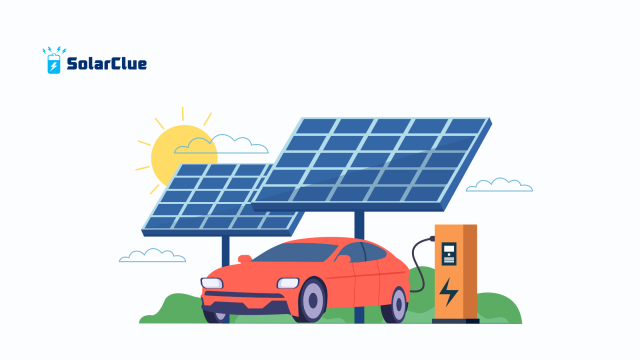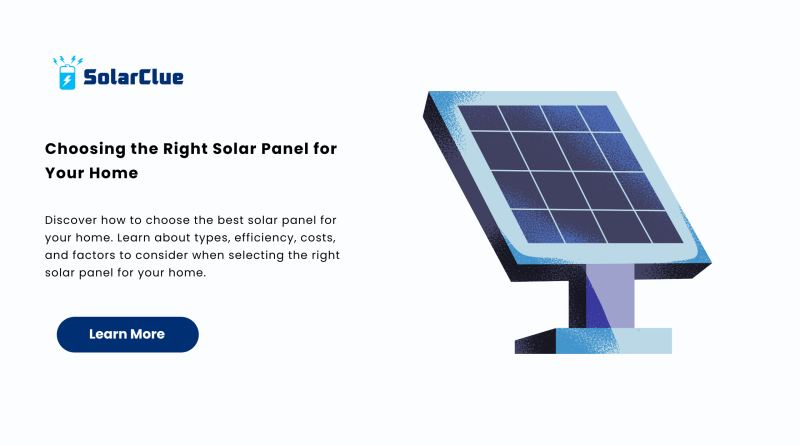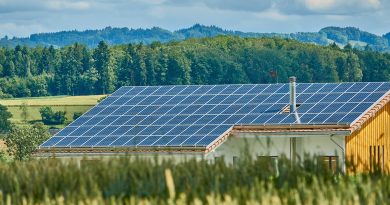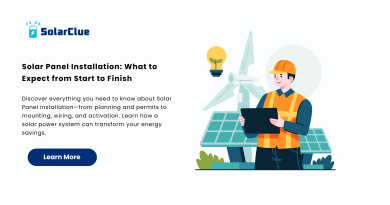Choosing the Right Solar Panel for Your Home
Choosing the Right Solar Panel for Your Home: Switching to solar power is one of the smartest decisions a homeowner can make today. Not only does it help reduce electricity bills, but it also supports a cleaner and more sustainable future. However, with so many options available, choosing the best solar panel for your home can feel overwhelming. In this guide, we’ll walk you through everything you need to know—types of solar panels, efficiency ratings, costs, and essential buying tips—to ensure you make an informed decision that meets your energy needs.
Table of Contents
Why Investing in Solar Power Makes Sense
Solar energy is renewable, abundant, and increasingly affordable thanks to technological advancements and government incentives. A properly installed solar power system can significantly cut your electricity expenses and even generate extra income through net metering. Additionally, adopting solar power helps reduce your carbon footprint, making your home more environmentally friendly.
Factors to Consider When Choosing a Solar Panel for Your Home
When selecting the best solar panel for your home, you should evaluate multiple factors:
1. Efficiency Rating
Efficiency refers to how much sunlight your solar panel can convert into usable electricity. Panels with higher efficiency can produce more power in limited space, which is ideal for homes with smaller roofs.
2. Type of Solar Panels
There are mainly three types of solar panels available:
-
Monocrystalline Panels: Known for high efficiency and sleek design. Best for limited roof space.
-
Polycrystalline Panels: More affordable but slightly less efficient. Suitable for larger roofs.
-
Thin-Film Panels: Lightweight and flexible, but with lower efficiency—ideal for unconventional installations.
3. Cost and Budget
The price of solar panels varies depending on type, brand, and efficiency. While high-efficiency panels may have a higher upfront cost, they often yield better long-term savings. Consider both the initial investment and the return on investment over time.
4. Warranty and Lifespan
Most solar panels come with a performance warranty of 25 years or more. A longer warranty indicates the manufacturer’s confidence in the panel’s durability and efficiency.
5. Brand Reputation and Certifications
Choose panels from trusted brands with certifications such as IEC or BIS for quality assurance. Reading customer reviews can also help you make the right choice.

Calculating Your Solar Power Needs
Before purchasing, calculate how much solar energy you require. Start by checking your average monthly electricity usage. Then, consider factors like sunlight hours in your location, roof orientation, and shading. Your installer can help you determine the size of the solar power system needed to meet your household’s energy demand.
The Installation Process
A professional installation is essential for optimal performance and safety. The process typically includes:
-
Site assessment and roof inspection
-
System design and panel selection
-
Installation of solar panels, inverters, and wiring
-
Connection to the grid or battery storage
-
Final inspection and commissioning
Benefits of the Right Solar Panel Choice
Choosing the right solar panel for your home brings multiple benefits:
-
Lower electricity bills
-
Increased property value
-
Energy independence
-
Environmental sustainability
Common Mistakes to Avoid
-
Choosing panels based solely on price
-
Ignoring roof suitability and shading
-
Overlooking warranty and maintenance requirements
-
Not comparing multiple brands and installers
FAQs
1. What is the lifespan of a solar panel?
Most solar panels last 25–30 years with proper maintenance. Efficiency may decline slightly over time, but they remain functional.
2. Do I need batteries with my solar power system?
Batteries are optional. They store excess solar energy for use at night or during power outages, but they add to the cost.
3. How many solar panels do I need for my home?
It depends on your energy usage, panel efficiency, and available roof space. A professional can provide an accurate estimate.
4. Are government incentives available for installing solar panels?
Yes, many regions offer subsidies, tax credits, or net metering policies to make solar power more affordable.
5. How do I maintain my solar panels?
Regular cleaning and annual inspections ensure your solar power system operates efficiently. Avoid using harsh chemicals when cleaning.
By understanding your energy needs, comparing panel options, and considering long-term benefits, you can confidently choose the best solar panel for your home. This investment not only saves money but also contributes to a greener planet. If you’re ready to make the switch to solar energy, explore the latest options at solarclue.com or read more insightful guides at blog.solarclue.com and take the first step towards a brighter, sustainable future.




